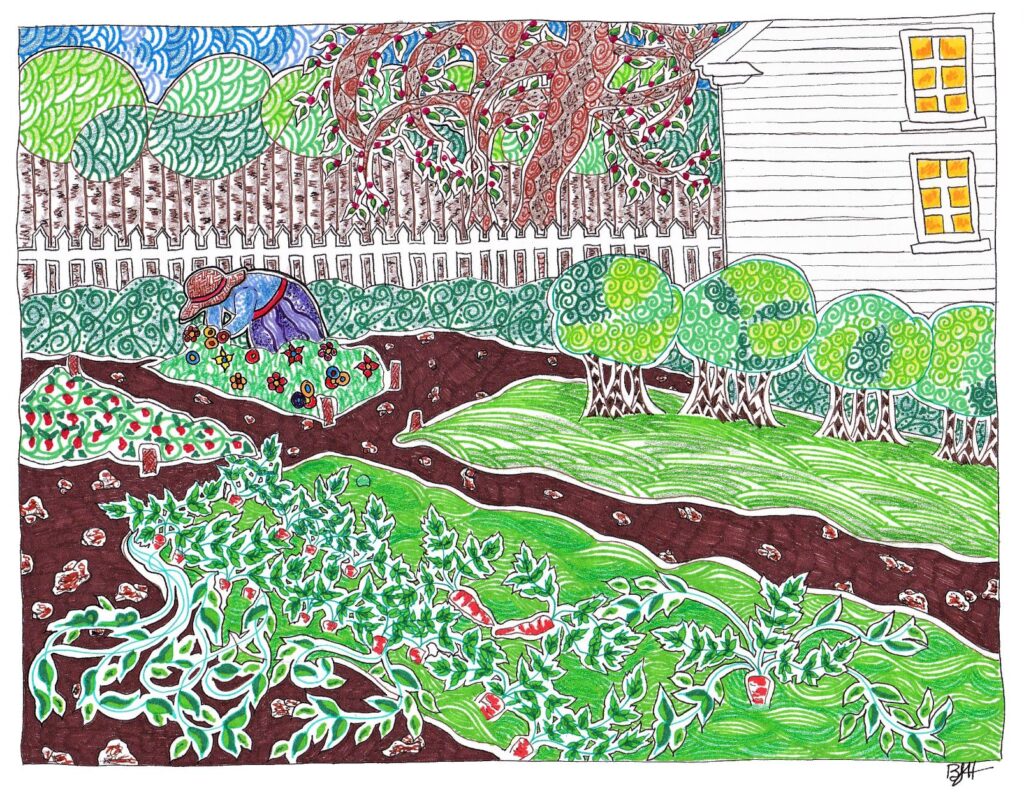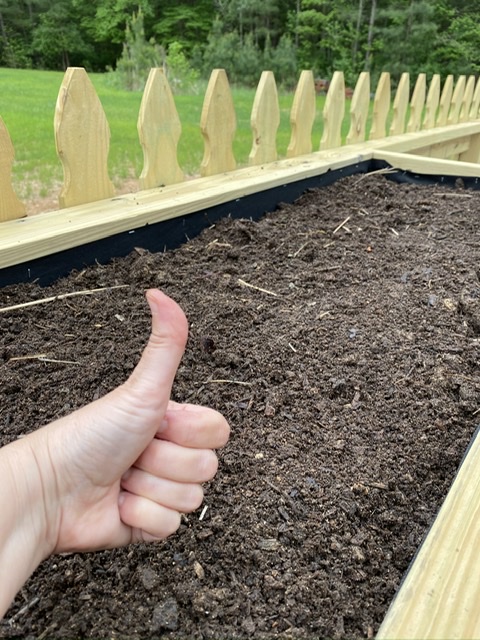My nephew recently moved to a new home in Connecticut and contacts me now and then for gardening advice. I have to say, these questions make my day. Not only does he send me photos and videos of him and his two young children working on their first garden, but it brings me so much joy to see him and his wife invested in creating a beautiful space for their family.
A recent conversation with Kyle (my nephew) got me pondering my pile of gold…my Compost Pile. On our very first morning here on the farm, I gathered up our table scraps from breakfast and blithefully brought them out to a spot at the edge of the yard…my selected location for our compost pile.
Soon after moving here in February, we picked up a truckload of horse manure and soon after that, we received a delivery of compost from a local landscaper. Our soil is hard clay (harder than the “hard pan” that Mom complained of in Connecticut). So we knew we would have to supplement the earth if we wanted to grow anything here in North Carolina. I spent a couple hours one afternoon, shoveling the manure from the truck onto my compost heap. And now, every evening after dinner, I gather up the day’s organic scraps and dump them upon my ever-growing pile. (I keep a covered jar on our countertop that Bill and I add scraps for the heap throughout the day.)

The compost pile has been invaluable as we’ve set up gardens. Our dooryard garden is totally covered with it, except for the stepping stones. The container gardens have a mixture of topsoil, manure and compost. And the large front garden was tilled to expose a blank slate of clay upon which I have dumped loads of compost for my wildflower patches and my mounds and rows for growing vegetables.

For anyone getting started in composting, I highly recommend it. If you have children, all the better! Composting makes for a great learning experience, teaching recycling, soil composition, earthworm life cycles and learning that you can use things in many ways with little waste.

Here are a few tips:
+Start small. Composting isn’t a huge undertaking. And it will organically grow into a larger pile every single day you add your scraps to it.
+The mix should be dry materials (carbon) and green materials (nitrogen). Once these are mixed up, the pile will start to “cook,” becoming rich compost. And don’t be surprised if you see steam rising from it as it’s decomposing. That’s a good thing!
+Be sure to turn the pile periodically. The scraps won’t cook unless they’re buried, and you’ll have less chance of animals getting into them. Less chance of smell that way, too.
Recipe for a rich compost pile:
+Scrape the area where you plan to keep your pile. I feel the pile does best on raw land so earthworms and other helpful critters have easy access, but you can also buy compost bins and barrels, if you’d like. Keep it away from the house, but not so far away that it’s a burden to deliver your daily scraps. Make sure it’s not in the full sun, and that you can hose water onto it during dry spells.
+Start off with dry or brown items, such as dried leaves, straw and/or twigs.
+Add grass clippings, kitchen waste from fruits and veggies, eggshells, sliced cardboard, paper towels, teabags, coffee grounds, coffee filters, scrunched white paper, bread. You can add herbivore manure. Be careful not to add too much grass, as its high nitrogen content will throw off the balance.
+Turn your pile with a pitchfork or shovel and add water periodically. The more often you turn and water the pile will aid in the decomposition.
+Never add the following: meat, dairy, fat/oil, dog/cat/human feces (ew), seeded weeds (you don’t want weeds sprouting in there), charcoal.
Having a pile of compost at the ready is a true treasure for any gardener, whether you’re growing small potted plants or a full-size garden. As I told Kyle, it’s a win-win situation: it’s fun, it’s economical, we’re not adding to the landfills quite so much, and it’s helping to grow the food we eat and the flowers and plants we enjoy so much.
Do you compost? I’d love to hear about your pile…seriously, I would!!!
Happy Composting!


You are a truly remarkable human being. Proud to call you friend.
Aw, you’re very kind, my friend!